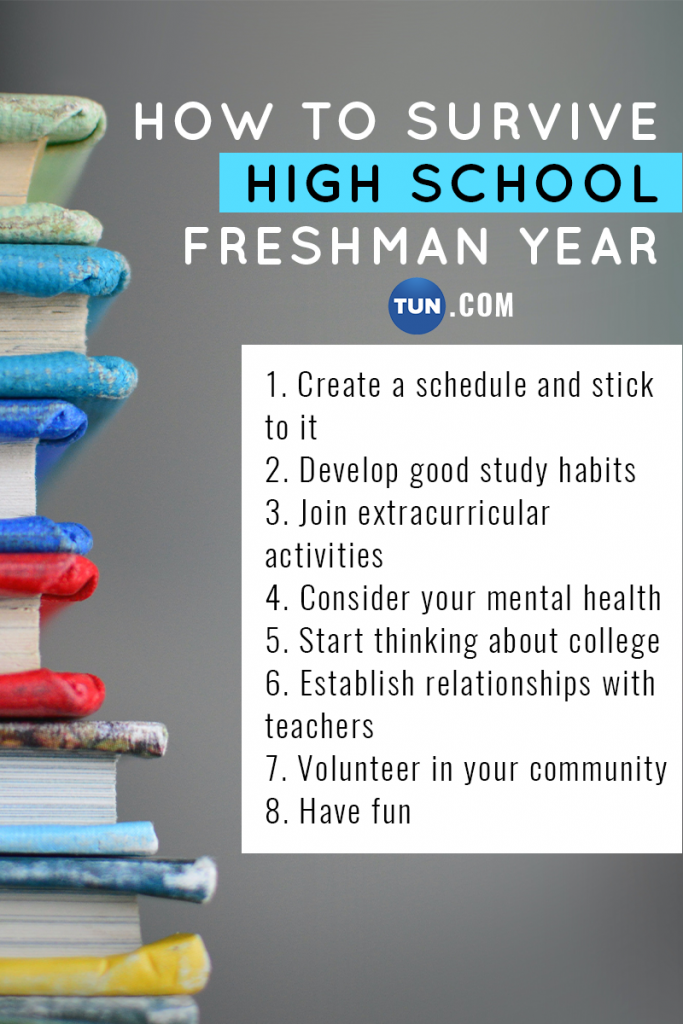Reaching freshman year of high school is a monumental moment in every student’s life. Like any major change, starting high school can be exciting and also entirely overwhelming.
The good news is, during your first year of high school, you don’t need to start worrying about things like SAT and ACT scores, getting into a good college, or deciding which career path you want to pursue. As a freshman, you should focus on easing your way into high school and setting yourself up for success by establishing a strong academic routine/plan, experimenting with new activities, and building a network of friends, teachers, and counselors.
Here are eight ways to ensure you thrive in freshman year.

Create a schedule and stick to it
The quickest way to get stressed out early on in high school is by falling behind in classes or starting the year off with some bad quiz and test scores. So, in order to make sure you stay on top of your studies and everything else going on in your life, you need to create a schedule and stick to it.
“Get yourself a planner to keep track of all your assignments, meetings, and events,” states a blog post published by the Jack Kent Cooke Foundation. “Stay ahead on your homework; it will likely be much more than before, so falling behind can be very detrimental.”
On the first day of classes, most of your teachers will hand out syllabi that include all of the important dates attached to homework, papers, quizzes, tests, and assignments. Jot those down in your planner and make sure to account for any prior engagements or conflicts. For example, if you have a tennis match on the same day that your mid-term paper is due, you’ll recognize that early on and make a note to finish the paper a day or two early.
Develop good study habits
The unfortunate truth is that all of your high school grades matter. So, you want to make sure that you’re performing well, even as early as the first quarter of your freshman year. And the easiest way to set yourself up for academic success is by developing good study strategies.
When it comes to study strategies, there is no universal approach. You need to experiment and find out what works best for you.
Visual learners, for example, may benefit from making flashcards, while auditory learners may retain information best by listening to recordings of lectures, lessons, or classroom discussions.
And those who feel particularly anxious or weighed down by the thought of studying may benefit from using the Pomodoro study method. The method uses a timer to break down studying into intervals of 25 minutes with short breaks in between. During the breaks, you can get on your phone, take a walk around the block, or make a quick bite to eat.
But, no matter your preferred method of studying, you should always make an effort to actively engage your brain, rather than just going through the motions.
If you’re creating a study guide, for example, UNC Chapel Hill’s Learning Center suggests writing down as much as you can from memory before using your notes to fill in the gaps. This will help you better understand what you do and don’t know so that you can focus your studies effectively.
And after a little while, when you think you have a decent grasp on the information, try to “become a teacher” by explaining the material to a friend or even back to yourself, UNC Chapel Hill’s Learning Center suggests. Metacognition, which is reflectively thinking about what you do and don’t know, is key to making your study efforts effective, the learning center adds.
For tips on how to study without stress and anxiety, check here.
If you’re taking online classes, check TUN’s interview with Rebecca Piety, director of testing and evaluation at the University of Central Florida, for tips on how to study for online classes.
Join extracurricular activities
There are so many reasons to join extracurricular activities in high school. Not only do extracurriculars help you stay active and make friends, but they also can help you identify your passions and interests, boost your academic scores, and, eventually, get into a top-tier college or university.
Throughout your freshman year and all of high school, you’ll be a lot happier if you identify something you love to occupy your time and momentarily distract you from classes, tests, and homework.
The best advice is to try every club, sport, and activity that is intriguing to you. If it turns out that it isn’t a good fit, move on to the next one. There is also a lot of value in finding out what you don’t like!
If you’re shopping around for extracurriculars, check out this article on 36 clubs you could join.
Consider your mental health
Going from middle school to high school is a transformative time, and transformative times are often accompanied by feelings of stress and anxiety. So, it is always a good idea to check in on yourself.
“Oftentimes, we don’t recognize that we are stressed until we are completely distressed and feeling overwhelmed by it,” Danielle Merolla, a clinical psychologist and the associate director of the Center for Prevention and Outreach at Stony Brook University, told TUN.
To prevent stress and anxiety from creeping up on you, you need to understand what your baseline is, said Merolla. On a day that you’re feeling good, evaluate things like how many hours you slept the night(s) before, what your diet looks like, and how physically active you’ve been. Once you’ve identified your baseline, try to keep those things consistent.
But, you should also understand that stress is inevitable. From time to time, like if you fail a test or miss a homework assignment, you’re going to experience brief moments of heightened, immediate stress. In these moments, the best thing you can do is breathe.
“Ultimately, when we are feeling stressed, anxious, or any type of more intense emotion, we tend to breathe shallow,” said Merolla. “When we breathe shallow, it immediately impacts our nervous system that then tells our brain we don’t have enough oxygen, that there is a lot to fear and there’s a lot to be concerned about. Then, all of a sudden, our body and mind become engaged in this kind of over-active process.”
“So, during those times, before walking into a test or an event, taking three deep diaphragmatic breaths — breathing literally from the belly up — then tells your brain, Oh, I have enough oxygen. It’s okay.” she added.
Start thinking about college
The good news is, you have a few years before you have to worry about sending in college applications. But you’ll thank yourself later if you start thinking about college as early as possible.
Begin by thinking about where you might want to go to college. This is the fun part. You get to fantasize about where you study and live for four or five years of your life. Start to look into programs, locations, and schools that interest you so that you can get a sense of what qualifications you’ll need to meet to be admitted. As you move further into high school, your school list should become shorter and molded around your academic scores and interests.
However, as a freshman, you shouldn’t worry too much about preparing for the SAT/ACT or any of the specific components of your college application, such as the essay or recommendation letters, for example. Throughout high school, you will learn things and meet people who will prepare you to take those steps.
Establish relationships with teachers and counselors
In addition to making friends early on in high school, you want to set yourself up for success by developing relationships with your teachers and counselors. They are the people who you will go to for help when you’re struggling in a class, having emotional trouble, need assistance with the college application process, or even need someone to write a letter of recommendation.
“Surround yourself with supportive people who can help guide you with comfort and advice,” states a blog post published by Western Governors University.
Relationships grow naturally, but you do need to make an effort to stand out. To start relationships with your teachers, be sure to speak up during class and routinely touch base with them to make sure they know you’re interested and engaged.
To start relationships with your counselors, swing by their office when you have a free moment, maybe before or after school or during lunch.
“It’s probably a good idea to visit your counselor and get to know him or her even if you don’t have a problem,” states a TeensHealth.org blog post. “This helps you feel comfortable with the counselor in case you ever do need to meet in a time of crisis. It’s usually easier to talk about a tough issue or a problem when you already feel comfortable with the counselor. Meeting your counselor when you’re not in the middle of a crisis also gives you a chance to discuss such issues as what the counselor will keep confidential and how he or she works with a student to resolve a problem.”
Volunteer in your community
The benefits of volunteering are endless. Not only will you be giving back to your community, but you will also develop practical skills and make valuable connections that will benefit you in high school, through college, and even in your eventual career.
Start with our comprehensive list of volunteering opportunities near you to see if there’s something that suits you.
You can also ask around at your school and at nearby nonprofits or community organizations. If you’ve identified a specific place where you would love to volunteer and they don’t have any opportunities listed, ask anyway! More often than not, groups will accept free help. And if they turn you down because you’re not old enough or they simply aren’t accepting volunteers, at least you will be on their radar when you reach the right age or opportunities do emerge!
There are also many websites that list volunteer opportunities. The best place to start is with TUN’s job search engine, where you can find hundreds of volunteer positions.
Have fun
There are all sorts of social and academic stressors attached to high school. When you’re feeling weighed down or unable to meet expectations, remember that fun is one of the ultimate stress relievers, according to the American Psychological Association.
Amid all of your academic and extracurricular responsibilities, “you also need to have times that you are scheduling breaks and that you’re also scheduling time to just not think about work or anything else but having fun and engaging with others,” explained Dr. Merolla.
Conclusion
Your ability to survive freshman year ultimately depends on the expectations you set for yourself. Early on in your freshman year, set some goals, whether they are to achieve a 3.0 GPA, to join an extracurricular activity, to volunteer in your community, or meet new people, and actively work on achieving them.



